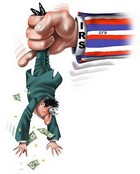Death, Taxes and Baseballs … The IRS & Bary Bonds Strikes Again
Barry Bonds is like a bad cough that just wont go away. Even after he hit 756*, one  would think that the lucky fan who wound up with the baseball had hit life’s lottery. Not to fast, enter the IRS. Did you think they are not going to get their? We may have just found one thing even more reprehensible that Barry Bond’s so-called breaking Hank Aaron’s home run record.
would think that the lucky fan who wound up with the baseball had hit life’s lottery. Not to fast, enter the IRS. Did you think they are not going to get their? We may have just found one thing even more reprehensible that Barry Bond’s so-called breaking Hank Aaron’s home run record.
“It’s an expensive catch,” said John Barrie, a tax lawyer with Bryan Cave LLP in New York who grew up watching the Giants play at Candlestick Park. “Once he took possession of the ball and it was his ball, it was income to him based on its value as of yesterday,”
That would instantly put Murphy, a college student from Queens, in the highest tax bracket for individual income, where he would face a tax rate of about 35 percent, or about $210,000 on a $600,000 ball.
Exactly how does one determine the value of a baseball? Its not a new car or boat that has an actual value. Its a baseball where at most it would cost $15.00 in any sporting goods store. Ok, now add the fact that there will be some presumed value to it as it was Barry Bond’s 756th* home run. How does one really determine what it is worth until it is sold? What is that really worth? There is a pending steroid investigation. What happens if the IRS places a value of $1 million on the baseball, makes 21-year-old Matt Murphy pay 38% of that and then it is determined that Bond’s did take steroids and the ball is worth ZERO! One has a worthless baseball that they have already had to pay a fictitious value on. Even if a fan gives the ball back to the player, there seems to be confusion over whether there is a tax bill required.
As Mark McGwire chased the mark for most home runs in a season in 1998, IRS officials initially said the ball that broke Roger Maris’ long-standing record could be subject to taxes even if it were returned to McGwire. The statements were ridiculed by politicians and quickly disavowed by the agency’s top brass.
“All I know is that the fan who gives back the home run ball deserves a round of applause, not a big tax bill,” then-IRS Commissioner Charles Rossotti said at the time.
If you liked this post, you may also like these:
Comments
6 Responses to “Death, Taxes and Baseballs … The IRS & Bary Bonds Strikes Again”
Leave a Reply

 RSS
RSS









Neon Nuts, yep that’s it,
Maybe the IRS should chase all that illegal money, drugs, prostitution and under the table pay.
That is why a national sales tax appeals to us taxpayers, as you will capture all moneys spent, legal and illegal. (notice how many cars and bling the underground money has?)
How can they determine a value if it has not been sold?
Yes your tax $$$ at work,
The ball is an asset, well that is if Bonds does not get nailed for steroid use. If that occurs the value will go down drastically.
However, an asset should only be taxed if it is used in that manner. Thats were the value should come from.
If the person sells it or borrows against it. That is a tangible value that is open to fair game.
To arbitrarily put a assumed value on it and tax someone is just ridiculous.
R
This is why we need the Fair Tax. The IRS has to go. If the IRS thinks the ball is worth $600K then they should be forced to purchase it and take their 35% from the proceeds.
DWA
Nobody knows what the frickin’ ball is worth until it is sold.
I have a Mickey Mantle Baseball card that I think is worth $1500, the best offer I’ve had is $1000. It’s all relative.
He can sell the ball to me for $8. Then I will give it back to him, and the IRS can go screw themselves.